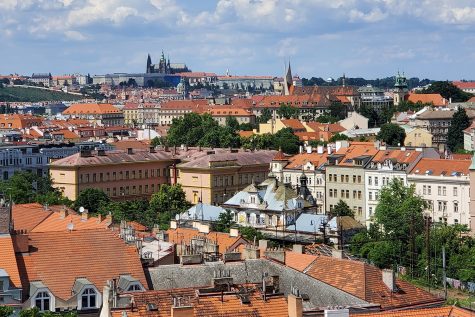Opinion: Iowan products and Chinese consumers: a first-hand perspective
The U.S.-China trade war can overshadow the human side of cross-cultural exchange.
Iowa Governor, Terry Brandstad, gives an opening address at the Growth and Opportunity Party Saturday October 31st, 2015. The event had several guest speakers from the Republican Party.
September 5, 2019
The Iowa State Fair drew both those native to the state and people from across to the world to the fairgrounds in Des Moines. The annual extravaganza made evident the human connection between China and the U.S. as the trade war rages on between the two world powers.
Former Iowa Gov. Terry Branstad was among those in attendance. Now the U.S. ambassador to China, Branstad represents the special bond between Iowan agriculture and the Chinese market.
During his visit, Branstad expressed his concern about the trade war’s effect on the state’s farmers when the Chinese government suspended its plan to purchase goods from Iowa. Born and raised in Iowa, and later elected to the state’s top executive post, he must be committed to protecting Iowans’ interests during the trade war. In fact, his experience exporting agricultural goods to China is a main reason he was named ambassador in the first place.
“The Chinese people do appreciate both the quality as well as the dependability of American food,” he said Aug. 12.
His comments remind me of my experience during my last visit to China. Last winter, I went back to my hometown, Fuzhou, in China, on my Christmas holiday. I found the prominence of American products in grocery stores there. Labeled as “imported from the U.S.,” the price of Iowa-produced beef and pork is always extraordinarily higher than local food. It means something for products be from Iowa.
I asked my mother, “Does anyone buy the ‘imported’ food stuff whose price is four times higher than the local ones in Walmart?” She answered that wealthier Chinese consumers want to buy high-quality and organic items.
Checking the label on a piece of beef, I felt excited to tell my mom, “You see, the beef is produced in Iowa.” However, my mom did not know much about the beef’s Iowa origins.
Many Chinese consumers like my mother only know items imported from the U.S. are partly banned because of the trade war. It is urgent, I suppose, to let them know that Iowan farmers remain willing to sell the best food to them.
To expand Chinese consumers’ knowledge of Iowa, the U.S. Embassy in Beijing invited some influential Chinese food bloggers and vloggers to attend the Iowa State Fair this year.
The mission of this trip was to portray the food and culinary culture in Iowa. Those internet-content creators have displayed their impressions of Iowan culinary culture for more than 10 million Chinese people, including my mother. Soon, she may point at the imported beef in my hometown Walmart and tell me, “See, we have made-in-Iowa food here.”
Based on my encounters with Iowan food in China and experiences at the State Fair, I believe it is urgent to let Chinese consumers know: despite the international conflict, the culinary and agricultural exchanges between Iowan farmers and Chinese consumers remain strong and mutually beneficial.


















